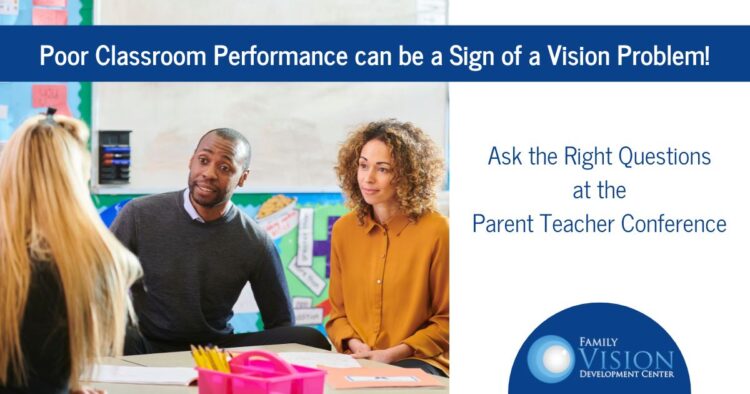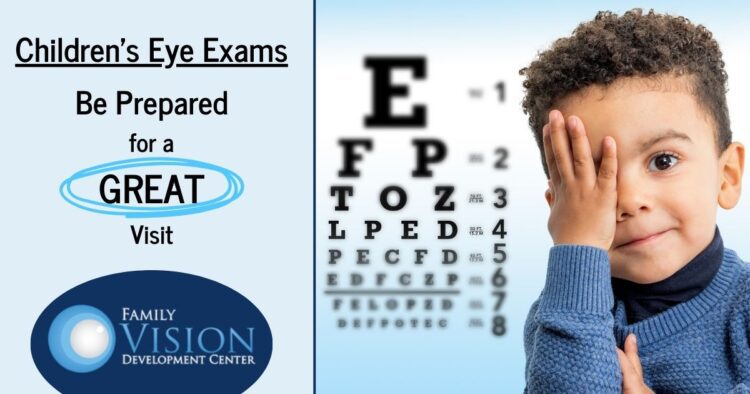November is typically the time of year that schools allow parents the opportunity to meet individually with their child’s teacher in order to assess their progress and discuss any issues before getting too far into the school year. As the teacher explains your child’s behaviors in the classroom, interactions with other students, punctuality with homework assignments and more, make sure to listen closely. If you hear the teacher mention any of the following issues, it could be a sign of an underlying vision condition.
Classroom Clues that can Indicate a Vision Issue
- Reading problems – a vision disorder can cause a child to transpose letters, confuse similar letters or words, skip lines or words while reading, or lose their place easily. Additionally, vision conditions often cause blurry or double vision. Any of these issues could obviously make reading extremely challenging.
- Avoids doing homework – if a student has a vision condition, it can be very difficult to complete visually demanding tasks. Therefore, they may lose interest or give up trying to complete assignments.
- Messy handwriting – Children with vision problems may have poor eye movement skills or poor visualization abilities. The lack of these necessary skills could prevent a child from being successful at writing.
- Sits too close to the board, computer screen or reading materials – when a student consistently positions himself or herself very close to things they need to read, it might mean they cannot see clearly from a distance. This can affect classroom performance when important information is outside of their clear field of vision.
- Poor behavior in the classroom – when a student cannot maintain focus, they may begin to act out. But many students are misdiagnosed with ADHD, when binocular vision disorders actually have similar symptoms. In fact, functional vision problems often mimic ADHD symptoms, such as difficulty focusing, fidgeting in their seat or making careless mistakes. Any child facing an ADHD diagnosis should also be examined for a binocular vision problem.
Additional Questions to ask the Teacher
Along with discussing classroom performance, it’s a good idea to also question any unusual frequent behaviors by your child. The teacher interacts with your child on a daily basis so ask if they notice any of the following occurring consistently throughout the day. While these issues may not directly affect their academic performance, they can be signs of a possible vision issue:
- Excessive rubbing of their eyes
- Abnormal head tilting or turning
- Often complains of headaches
- Sensitivity to light
- Poor hand-eye coordination
- Frequently bumps into things
Explore the Possibility of a Binocular Vision Disorder
A teacher may be quick to assume that a child has a problem with learning new material, has a behavior issue, is not interested in participating or does not have the capability to succeed in school. However, this could be because they have not been trained to watch for signs of an underlying binocular vision condition. Correcting a binocular vision disorder can be just what your child needs to experience school in a whole new way and enjoy the success they truly want!
When you bring your child in to Family Vision Development Center for a comprehensive vision exam, we will thoroughly evaluate and diagnose any vision issues that could be affecting your child’s school performance. Additionally, we offer many ways to effectively treat the common binocular vision disorders that can cause classroom struggles. In fact, our doctors have extensive training in the latest vision therapy techniques that can vastly improve your child’s visual skills. Contact us at 630-862-2020 to schedule your appointment and set your child on a path to success.
Family Vision Development Center is a full-service vision center offering innovative vision therapy services, sports vision therapy services, post-concussive vision rehabilitation, comprehensive vision exams for eyeglasses and contact lenses, management of ocular diseases including glaucoma, diabetes, macular degeneration and cataracts, and a state-of-the-art optical center offering the latest designs in eyewear.
Vision plays an essential role in our overall well-being. Therefore, taking care of that vision should be a high priority, especially for parents. A child’s eye exam can be a scary event for both the child and the parent if you don’t know what to expect. But the team at Family Vision Development Center is here to assure you that there is nothing to be concerned about! Regular vision exams are the best way to maintain your child’s healthy vision and we are committed to making the process as easy as possible.
When to Bring your Child in for a Visit
The American Optometric Association (AOA) recommends that infants have their first comprehensive eye exam at 6 months old. Moving forward, they should return at age 3, then again at age 5 or 6 when the child starts first grade. School-aged children should have an eye exam every two years if no vision correction is required. If a child needs corrective glasses or contact lenses, it is recommended that they get an exam every year in order to ensure proper vision correction. Following these guidelines is an important way to allow for quick diagnosis and treatment of any potential vision concerns.
What to Expect at your Child’s Eye Exam
When you bring your child to Family Vision Development Center, you can expect that we will provide a comfortable environment where your child feels safe and welcome! This exam is where we collect all of the necessary information and testing to determine the health of your child’s eyes and if any vision correction is required.
During this assessment, we will gather information about your child’s medical history, and will perform tests to determine how well the eyes are functioning and to check for signs of eye problems such as amblyopia, eye misalignment, convergence insufficiency, poor depth perception or focusing issues. Some of the tests we might perform during your child’s eye exam include:
- Visual acuity test – we assess visual clarity by having the child identify letters or pictures of varying sizes
- Refraction test – this helps us determine if your child needs glasses or contact lenses
- Pupil test – we quickly flash a light into each eye to see how the pupil responds
- Eye movement test – here we assess how well your child’s eyes align and move together, which is crucial for proper depth perception and coordination
How to Best Prepare for your Child’s Eye Exam
A child’s eye exam can go more smoothly if you are prepared! Here are some easy tips to make the visit easier for you and your child:
- Schedule the appointment properly – when choosing a time, make sure that it fits well with your child’s schedule. For example, try not to schedule a time when they would normally be napping or during a time when they are typically tired or cranky. Happy kids make for easier appointments!
- Bring appropriate items with – before heading out to the exam, check to make sure you have all important information, such as your child’s and family medical history, previous prescription information, as well as your current insurance information. The more organized you are, the less likely the chance of delays.
- Talk to your child before you go – much of the nervousness from kids comes because they do not know what to expect. They will be much more at ease if you explain to them that the doctor will look at their eyes, ask some questions and do a few tests. But the tests are not painful and the team is very nice so there is nothing for them to be afraid of.
- Bring a few small toys or their favorite stuffed animal – we always try to stay on schedule, but in the event of an emergency there may be an unexpected wait. In those cases, it’s best to have something to keep your child occupied while they wait. And having a comfort item like a blanket or animal can help calm their nerves during the exam.
- Stay calm and supportive – as much as you prepare a child, it is still normal for them to be apprehensive during their visit. Simply giving them words of encouragement about the great job they are doing can go a long way in helping them to stay calm throughout the visit.
- Plan a post-visit treat – kids love rewards! Consider planning a fun activity or treat for your child after the exam to give them something to look forward to and to make the experience more enjoyable.
Keep in mind that we are here to help make your visit as easy as possible. We take great pride in the care that we provide to our young patients and want to provide them a lifetime of healthy vision! Contact us at 630-862-2020 to schedule your appointment or to ask any additional questions.
Family Vision Development Center is a full-service vision center offering innovative vision therapy services, sports vision therapy services, post-concussive vision rehabilitation, comprehensive vision exams for eyeglasses and contact lenses, management of ocular diseases including glaucoma, diabetes, macular degeneration and cataracts, and a state-of-the-art optical center offering the latest designs in eyewear. We are dedicated to keeping our patients comfortable and well-informed and we will explain every exam and procedure and answer all of your questions. We accept both scheduled and emergency appointments, and offer convenient financing and insurance options to ensure that high-quality vision care is available and affordable to all of our patients.



